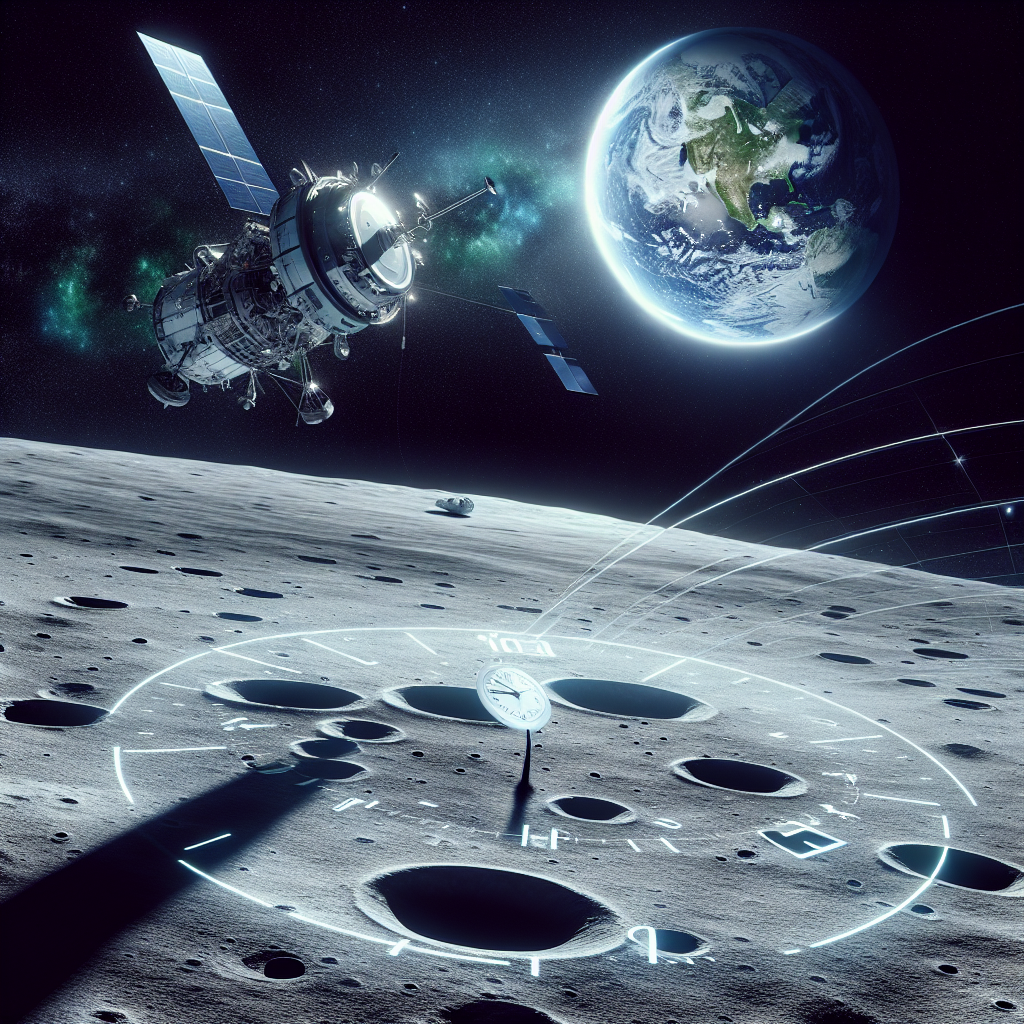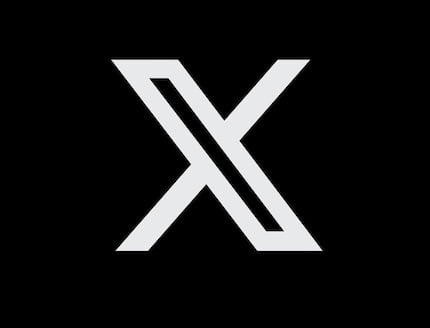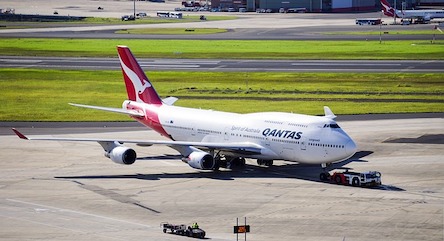The White House wants NASA to make a new time zone for the Moon called Coordinated Lunar Time (LTC). The Moon’s gravity makes time go faster there, about 58.7 microseconds per day. This might not seem like a big deal, but it can affect how spacecraft work together. The US government hopes that having a new time zone will help everyone work together to reach the Moon.
According to Professor Catherine Heymans, who studies space in Scotland, gravity affects time in different places. The Moon has weaker gravity, so clocks run differently there. On Earth, we use atomic clocks to measure time really precisely. These clocks measure the energy of atoms to keep track of time to the billionth of a second. If we put these clocks on the Moon, they would run one second faster over 50 years.
NASA isn’t the only group trying to make a lunar time system. The European Space Agency is also working on one. But to make a new time zone, countries need to agree and have a group in charge. Right now, the International Bureau of Weights and Measures is in charge of time on Earth. They’ll need to decide where the new time zone starts and how far it goes with help from everyone.
The US wants to have LTC ready by 2026 for its mission to the Moon called Artemis-3. This will be the first time we go back to the Moon’s surface since 1972. It’s really important to be precise when we go to the Moon because we need to know exactly where we’re going. If we make mistakes, the spacecraft could go into the wrong orbit. Plus, if we don’t have the same time for different missions, it could be hard to send data and talk to each other in space.
Original news source: White House wants Moon to have its own time zone (BBC)
🎧 Listen:
Slow
Normal
Fast
📖 Vocabulary:
| 1 | Coordinated | Working together in a well-organized way |
| 2 | gravity | The force that pulls objects towards each other, like how we stay on the ground |
| 3 | microseconds | Really, really tiny units of time, much less than a second |
| 4 | spacecraft | Vehicles designed for travel or operation in outer space |
| 5 | atomic | Relating to atoms, which are the basic units of matter |
| 6 | lunar | Having to do with the Moon |
| 7 | precise | Extremely accurate or exact |
| 8 | European Space Agency | An organization in Europe that works on space exploration |
| 9 | International Bureau of Weights and Measures | A group that sets standards for measurements around the world |
| 10 | Artemis-3 | The name of a mission to go back to the Moon |
| 11 | orbit | The path an object takes as it moves around another object in space |
| 12 | missions | Specific tasks or journeys, especially in terms of space exploration |
| 13 | data | Information, especially facts or numbers, collected to be examined |
| 14 | communicate | To exchange information or ideas with someone else, often over a distance |
| 15 | surface | The outer layer or top part of something, like the ground we walk on |
Group or Classroom Activities
Warm-up Activities:
– News Summary
Instructions: In pairs, students will read the article and summarize the main points in their own words. They should focus on key details such as the need for a new time zone on the Moon and the implications for spacecraft and communication.
– Word Association
Instructions: In groups, students will take turns saying a word that comes to mind when they think about the article. The word can be related to the topic, a concept mentioned in the article, or simply a word that they associate with space and time. The goal is to generate a discussion and expand vocabulary related to the topic.
– Sketch It
Instructions: In pairs, one student will describe a scene or concept from the article to their partner without using any specific words from the article. The other student must then try to sketch what they think is being described. After a set amount of time, they should compare the sketch to the original description and discuss any differences or misunderstandings.
– Pros and Cons
Instructions: In groups, students will discuss the pros and cons of creating a new time zone for the Moon. They should consider the potential benefits, such as improved coordination and communication for space missions, as well as any drawbacks or challenges that may arise. Each group can then present their findings to the class and engage in a debate or discussion.
– Two Truths and a Lie
Instructions: In pairs, students will take turns sharing three statements about the article, two of which are true and one of which is false. Their partner must then guess which statement is the lie. This activity encourages students to engage with the content of the article and practice their listening and critical thinking skills.
🤔 Comprehension Questions:
1. Why does the White House want NASA to create a new time zone for the Moon?
2. How does the Moon’s gravity affect time?
3. How do atomic clocks measure time on Earth?
4. What would happen to atomic clocks if they were placed on the Moon?
5. Besides NASA, which other group is working on a lunar time system?
6. What needs to happen for a new time zone to be created?
7. Why is it important to have a precise time system when going to the Moon?
8. What could happen if there are different times for different missions in space?
Go to answers ⇩
🎧✍️ Listen and Fill in the Gaps:
The White House wants NASA to make a new time zone for the Moon (1)______ Coordinated (2)______ Time (LTC). The Moon’s gravity makes time go faster there, about 58.7 microseconds per day. This might not seem like a big deal, but it can affect how (3)______ work together. The US government hopes that having a new time zone will help everyone work together to reach the Moon.
According to Professor (4)______ Heymans, who studies space in (5)______, gravity affects time in different places. The Moon has weaker gravity, so clocks run differently there. On Earth, we use (6)______ clocks to measure time really precisely. These clocks measure the energy of (7)______ to keep track of time to the billionth of a (8)______. If we put these clocks on the Moon, they would run one second faster over 50 years.
NASA isn’t the only group trying to make a lunar time system. The (9)______ Space Agency is also working on one. But to make a new time zone, countries need to (10)______ and have a group in charge. Right now, the International Bureau of Weights and Measures is in charge of time on (11)______. They’ll need to (12)______ where the new time zone starts and how far it goes with help from everyone.
The US wants to have LTC ready by 2026 for its mission to the Moon called Artemis-3. This will be the first time we go back to the Moon’s (13)______ since 1972. It’s really important to be (14)______ when we go to the Moon because we need to know exactly where we’re (15)______. If we make mistakes, the spacecraft could go into the wrong orbit. Plus, if we don’t have the same time for different (16)______, it could be hard to send data and talk to each other in space.
Go to answers ⇩
💬 Discussion Questions:
Students can ask a partner these questions, or discuss them as a group.
1. What is a time zone?
2. How would you feel if you had to adjust to a new time zone on the Moon?
3. Do you think it’s important for spacecraft to have the same time for missions? Why or why not?
4. What do you think would happen if the spacecraft went into the wrong orbit?
5. How do you think having a new time zone on the Moon could help everyone work together to reach the Moon?
6. Do you like the idea of a Coordinated Lunar Time? Why or why not?
7. What is an atomic clock and why is it used to measure time precisely?
8. How do you think weaker gravity on the Moon affects the way clocks run there?
9. How do you think having a different time zone on the Moon could affect communication between astronauts?
10. What do you think the International Bureau of Weights and Measures should consider when deciding where the new time zone starts and how far it goes?
11. How would you feel if you were part of the mission to the Moon and had to follow the new lunar time system?
12. What do you think are the benefits of being precise when going to the Moon’s surface?
13. What do you think are the challenges of making a new lunar time system?
14. How do you think the new time zone on the Moon could impact future space exploration?
15. What is your opinion on NASA’s plan to have LTC ready by 2026? Why or why not?
Individual Activities
📖💭 Vocabulary Meanings:
Match each word to its meaning.
Words:
1. Coordinated
2. gravity
3. microseconds
4. spacecraft
5. atomic
6. lunar
7. precise
8. European Space Agency
9. International Bureau of Weights and Measures
10. Artemis-3
11. orbit
12. missions
13. data
14. communicate
15. surface
Meanings:
(A) Really, really tiny units of time, much less than a second
(B) Having to do with the Moon
(C) An organization in Europe that works on space exploration
(D) Specific tasks or journeys, especially in terms of space exploration
(E) A group that sets standards for measurements around the world
(F) The outer layer or top part of something, like the ground we walk on
(G) Relating to atoms, which are the basic units of matter
(H) Vehicles designed for travel or operation in outer space
(I) The name of a mission to go back to the Moon
(J) Extremely accurate or exact
(K) Information, especially facts or numbers, collected to be examined
(L) The force that pulls objects towards each other, like how we stay on the ground
(M) Working together in a well-organized way
(N) To exchange information or ideas with someone else, often over a distance
(O) The path an object takes as it moves around another object in space
Go to answers ⇩
🔡 Multiple Choice Questions:
1. Why does the White House want NASA to create a new time zone for the Moon?
(a) The current time zone on the Moon is not accurate.
(b) The US government wants to control time on the Moon.
(c) The International Bureau of Weights and Measures requested it.
(d) The Moon’s gravity affects time and it can impact how spacecraft work together.
2. How much faster does time go on the Moon compared to Earth?
(a) About 1 second per day.
(b) About 50 years per second.
(c) About 1 billionth of a second per day.
(d) About 58.7 microseconds per day.
3. What do we use on Earth to measure time precisely?
(a) Lunar clocks.
(b) Solar clocks.
(c) Atomic clocks.
(d) Digital clocks.
4. Why does NASA want to create a lunar time system?
(a) To control time on the Moon.
(b) To make the European Space Agency happy.
(c) To ensure everyone can work together to reach the Moon.
(d) To have a new technological advancement.
5. Who is currently in charge of time on Earth?
(a) The International Bureau of Weights and Measures.
(b) NASA.
(c) The White House.
(d) The European Space Agency.
6. When does the US want the new lunar time zone to be ready?
(a) By 2050.
(b) By 2026.
(c) By 1972.
(d) By 2035.
7. Why is it important to be precise when going to the Moon?
(a) Mistakes could cause the spacecraft to go into the wrong orbit.
(b) Mistakes could cause time to go faster on the Moon.
(c) Mistakes could lead to a new time zone on Earth.
(d) Mistakes could lead to a new mission to Mars.
8. What could be a challenge if different missions have different time zones on the Moon?
(a) The Moon’s gravity could change.
(b) Sending data and communication between spacecraft could be difficult.
(c) The International Bureau of Weights and Measures would be unhappy.
(d) The US government would lose control over time on the Moon.
Go to answers ⇩
🕵️ True or False Questions:
1. This difference in time can impact how spacecraft work together.
2. If atomic clocks were placed on the Moon, they would run one second faster over 50 years.
3. Gravity affects time differently in various locations, including the Moon, due to its weaker gravity.
4. The Moon’s gravity causes time to move slower there, about 58.7 microseconds per day.
5. The US aims to have HLT established by 2026 for its upcoming mission to the Moon named Artemis-3.
6. On Earth, mechanical clocks are used to measure time with extreme precision.
7. The US government believes that having a new time zone will help facilitate collaboration in reaching the Moon.
8. The White House wants NASA to establish a new time zone for the Moon called Harmonized Lunar Time (HLT).
Go to answers ⇩
📝 Write a Summary:
Write a summary of this news article in two sentences.
Check your writing now with the best free AI for English writing!
Writing Questions:
Answer the following questions. Write as much as you can for each answer.
Check your answers with our free English writing assistant!
1. Why does the White House want NASA to create a new time zone for the Moon?
2. How does the Moon’s gravity affect time?
3. How do atomic clocks measure time on Earth?
4. Why is it important to have a new time zone for missions to the Moon?
5. Who is currently in charge of time on Earth and what role will they play in creating the new lunar time zone?
✅ Answers
🤔✅ Comprehension Question Answers:
1. Why does the White House want NASA to create a new time zone for the Moon?
The White House wants NASA to create a new time zone for the Moon to help everyone work together more efficiently and effectively in reaching the Moon.
2. How does the Moon’s gravity affect time?
The Moon’s weaker gravity causes time to go faster there, about 58.7 microseconds per day.
3. How do atomic clocks measure time on Earth?
Atomic clocks measure time on Earth by measuring the energy of atoms to keep track of time to the billionth of a second.
4. What would happen to atomic clocks if they were placed on the Moon?
If atomic clocks were placed on the Moon, they would run one second faster over 50 years.
5. Besides NASA, which other group is working on a lunar time system?
The European Space Agency is also working on a lunar time system.
6. What needs to happen for a new time zone to be created?
For a new time zone to be created, countries need to agree and there needs to be a group in charge, such as the International Bureau of Weights and Measures.
7. Why is it important to have a precise time system when going to the Moon?
It is important to have a precise time system when going to the Moon because it helps ensure that spacecraft go into the correct orbit and allows for accurate communication and data transmission between missions.
8. What could happen if there are different times for different missions in space?
If there are different times for different missions in space, it could be difficult to send data and communicate with each other effectively. It could also lead to mistakes and confusion in spacecraft navigation and coordination.
Go back to questions ⇧
🎧✍️✅ Listen and Fill in the Gaps Answers:
(1) called
(2) Lunar
(3) spacecraft
(4) Catherine
(5) Scotland
(6) atomic
(7) atoms
(8) second
(9) European
(10) agree
(11) Earth
(12) decide
(13) surface
(14) precise
(15) going
(16) missions
Go back to questions ⇧
📖💭✅ Vocabulary Meanings Answers:
1. Coordinated
Answer: (M) Working together in a well-organized way
2. gravity
Answer: (L) The force that pulls objects towards each other, like how we stay on the ground
3. microseconds
Answer: (A) Really, really tiny units of time, much less than a second
4. spacecraft
Answer: (H) Vehicles designed for travel or operation in outer space
5. atomic
Answer: (G) Relating to atoms, which are the basic units of matter
6. lunar
Answer: (B) Having to do with the Moon
7. precise
Answer: (J) Extremely accurate or exact
8. European Space Agency
Answer: (C) An organization in Europe that works on space exploration
9. International Bureau of Weights and Measures
Answer: (E) A group that sets standards for measurements around the world
10. Artemis-3
Answer: (I) The name of a mission to go back to the Moon
11. orbit
Answer: (O) The path an object takes as it moves around another object in space
12. missions
Answer: (D) Specific tasks or journeys, especially in terms of space exploration
13. data
Answer: (K) Information, especially facts or numbers, collected to be examined
14. communicate
Answer: (N) To exchange information or ideas with someone else, often over a distance
15. surface
Answer: (F) The outer layer or top part of something, like the ground we walk on
Go back to questions ⇧
🔡✅ Multiple Choice Answers:
1. Why does the White House want NASA to create a new time zone for the Moon?
Answer: (d) The Moon’s gravity affects time and it can impact how spacecraft work together.
2. How much faster does time go on the Moon compared to Earth?
Answer: (d) About 58.7 microseconds per day.
3. What do we use on Earth to measure time precisely?
Answer: (c) Atomic clocks.
4. Why does NASA want to create a lunar time system?
Answer: (c) To ensure everyone can work together to reach the Moon.
5. Who is currently in charge of time on Earth?
Answer: (a) The International Bureau of Weights and Measures.
6. When does the US want the new lunar time zone to be ready?
Answer: (b) By 2026.
7. Why is it important to be precise when going to the Moon?
Answer: (a) Mistakes could cause the spacecraft to go into the wrong orbit.
8. What could be a challenge if different missions have different time zones on the Moon?
Answer: (b) Sending data and communication between spacecraft could be difficult.
Go back to questions ⇧
🕵️✅ True or False Answers:
1. This difference in time can impact how spacecraft work together. (Answer: True)
2. If atomic clocks were placed on the Moon, they would run one second faster over 50 years. (Answer: True)
3. Gravity affects time differently in various locations, including the Moon, due to its weaker gravity. (Answer: True)
4. The Moon’s gravity causes time to move slower there, about 58.7 microseconds per day. (Answer: False)
5. The US aims to have HLT established by 2026 for its upcoming mission to the Moon named Artemis-3. (Answer: False)
6. On Earth, mechanical clocks are used to measure time with extreme precision. (Answer: False)
7. The US government believes that having a new time zone will help facilitate collaboration in reaching the Moon. (Answer: True)
8. The White House wants NASA to establish a new time zone for the Moon called Harmonized Lunar Time (HLT). (Answer: False)
Go back to questions ⇧















